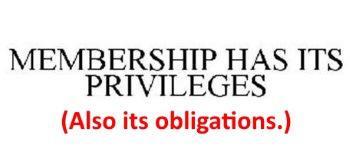 On a hunch, I did a search of Supreme Court cases on Findlaw.com looking for the phase “privilege of citizenship”. Findlaw indicated that there are 716 cases where that phrase occurs.
On a hunch, I did a search of Supreme Court cases on Findlaw.com looking for the phase “privilege of citizenship”. Findlaw indicated that there are 716 cases where that phrase occurs.
That’s pretty good evidence that citizenship is a privilege.
• I did another search of Supreme Court cases on Findlaw.com looking for the phrase “right of citizenship”. Findlaw indicated there are 1,540 cases where that phrase occurs.
That’s pretty good evidence that citizenship is a right.
• So what is citizenship—a privilege or a right?
I don’t know the answer to that question and I certainly don’t plan to read 2,256 Supreme Court cases to find out.
Apparently, the answer is “both”.
Sometimes, citizenship is a privilege; sometimes it’s a right.
In theory, it might even be possible that sometimes, citizenship is both a privilege and a right.
It’s also conceivable that some forms of citizenship (“citizen of the United States”?) are a privilege while other forms (“citizen of The State of Texas”?) are a right.
Determining whether a particular kind of citizenship is a right or a privilege is important since, so far as I know, “rights” are always good, beneficial and unencumbered. “Privileges,” on the other hand, can be a mixed blessing because it’s my understanding that “privileges” include obligations.
For example, the modern license to drive is deemed a “privilege” (rather than a right) because that license includes the obligation to obey the rules of the road, be subject to the traffic laws and traffic cops and pay a fee to have your vehicle registered and insured every year. Modern driving is not a “right” but a “privilege”. That “privilege” includes the obligation to signal whenever you turn right or left, fasten your seatbelt when driving, and submit to a sobriety test if the police think you’re inebriated.
Everyone wants the “right” to drive. Very few want the “privilege” to drive because that privilege includes onerous obligations.
• Similarly, the “right” to be a citizen may be a great blessing, while the “privilege” of citizenship could include the obligation to register for the draft and pay income taxes.
Rights are blessing. Privileges can be a chore.
I strongly suspect that rights are associated with the beneficiaries of a trust, while “privileges” are associated with the trustees/fiduciaries of a trust.
• I’m very wary of “privileges”. I strongly suspect that government habitually provides us with opportunities to voluntarily sign up for seeming harmless and desirable “privileges” that we mistake for “rights”. Whenever we voluntarily sign up for the privileges of driving, voting, fishing, welfare, practicing law or practicing medicine or piloting an airplane, I suspect that we unwittingly also voluntarily subject ourselves to onerous rules, regulations and obligations that we did not expect or understand.
I don’t yet have any answers to reliably explain the difference between “rights” and “privileges”. However, I’m hoping that:
1) This brief article will sensitize some of its readers to the potential difference between “rights” and “privileges”; and,
2) Some of this article’s readers will already have some reliable insight into the distinction between rights and privileges that they’ll share in the comments below.
